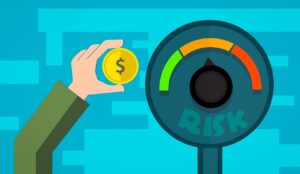
The world is crazy right now. The war with Russia and Ukraine has created investment risks and opportunities with commodities, specifically. Inflation is also an issue. What do you do with all of these moving parts in the global economy?
Gold
Gold has only gone up since the war began, up over $2,000 for the first time since 2020. The reason being is that gold is a store of value and is often seen as a safe asset during times of uncertainty, like war, inflation, or a pandemic.
Gold isn’t the only asset that’s used in times of uncertainty. Cash, bonds, and other precious metals have also seen a massive inflow lately.
Crypto
Cryptocurrencies have also seen a run-up in recent weeks, for two reasons. One, some people do see cryptocurrencies as a store of value like gold. And two, cryptocurrencies have played a role in this war. Because Russia has been cut off, financially, from the rest of the world, they’ve used crypto to finance operations. Ukraine has done the same, but for the reason of being able to raise money from different channels.
Oil
The price of oil has been on a roller coaster since the war began. Russia supplies a lot of energy to the world. It supplies the U.S. with just 3% of oil, but it supplies Europe with most of what they use. That said, the price of oil went up very fast to about $125/barrel because the US and other countries blocked them off to further disrupt their finances.
It’s come back down since then thanks to OPEC+. They pledged to increase production to make up for the loss in supply.
Inflation
Inflation is off the charts right now. The most recent reading came in at 7.9%. There are quite a few things that are seeing the effects of it. Food is getting more expensive. Gas, obviously, due to supply constraints and inflation is getting more expensive. Property is also getting more expensive. Interest rates are going up as well. My wife and I refinanced late last year and locked our rate in at 3%. The most recent reading came in at 4.5%.
The FED is going to make some moves as well. Because of the war with Russia and Ukraine, they will take a more measured and conservative approach, so it’s possible that inflation is a problem for longer because the FED won’t hike rates as quickly as they may have previously intended.
Commodities
There are some other commodities, besides gold and other precious metals, that are feeling a pinch due to the war between Russia and Ukraine. Wheat is the biggest example of this because between Russia and Ukraine, they produce and ship a third of the world’s wheat.
Unintended consequences
Even though the war is between two countries, it’s affecting everything (though differently than how it’s affecting Russia and Ukraine). There are logistical problems that are delaying shipments of things. The air space above the scuffle is off-limits, so flights around the area are taking longer than they previously would have. Longer flights = more fuel and reduced volume on flights = increased costs.
There are a lot of investment risks and opportunities due to the moving parts in the world right now and the market will continue to be volatile until things settle down. If you have time to ride out some ugly markets, stick to your plan. If you’re in retirement or close to retirement, reducing your risk might not be a bad idea.
Related reading:
How to Invest in Gold: 5 Ways to Get Started
How Inflation is Changing Our Lives and Not for the Better
Weekly Wrap: Crypto Aids Ukraine Putin Aids Inflation and Russian Investments Tank
Safeguarding Your Future: A Comprehensive Review Of Augusta Precious Metals
Disclaimer:
**Securities offered through Securities America, Inc., Member FINRA/SIPC. Advisory services offered through Securities America Advisors, Inc. Securities America and its representatives do not provide tax or legal advice; therefore, it is important to coordinate with your tax or legal advisor regarding your specific situation. Please see the website for full disclosures: www.crgfinancialservices.com
My name is Jacob Sensiba and I am a Financial Advisor. My areas of expertise include, but are not limited to, retirement planning, budgets, and wealth management. Please feel free to contact me at: jacob@crgfinancialservices.com
